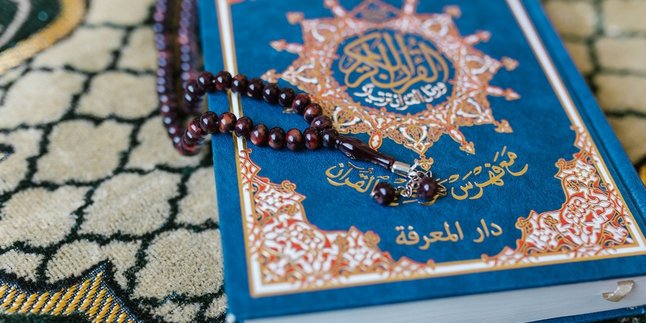Kapanlagi.com - Zakat fitrah is one of the sacred obligations in Islam that must be fulfilled by every Muslim before celebrating Eid al-Fitr. This zakat is not just a ritual, but also serves as a purification of the soul after we have performed fasting during the month of Ramadan, as well as a manifestation of our concern for those in need.
Every Muslim individual, whether male or female, including children who are still dependent on their parents, is required to pay this zakat fitrah. When paying zakat, there is a recitation of intention that must be uttered, and this intention varies depending on whom the zakat is intended for—whether for oneself, children, spouse, or other family members. Therefore, it is important for us to understand the correct pronunciation of the intention so that the zakat given is valid and in accordance with Islamic law.
In addition, zakat fitrah has provisions regarding the time of payment and who is obligated to pay it. Based on a hadith from Ibn Umar, the Prophet Muhammad (SAW) said, "Zakat fitrah is obligatory for every Muslim, whether free or enslaved, male or female, young or adult, and must be paid before the Eid al-Fitr prayer." (HR. Bukhari and Muslim). So, how do we properly fulfill zakat fitrah? Here is the complete review.
1. What is Zakat Fitrah and Who is Obligated to Pay It?
Zakat fitrah, an obligation that is inseparable for every capable Muslim, must be paid before the performance of the Idulfitri prayer at the end of the month of Ramadan. Since the second year of Hijri, this zakat has been an important part of our worship, alongside the obligation of fasting during Ramadan.
According to Islamic law, every living Muslim individual who is alive until the night of Idulfitri is required to pay zakat fitrah. This means that if someone dies before sunset on the last day of Ramadan, they are not obligated to pay zakat. However, a baby born before sunset on that day is still required to receive their zakat.
The obligation to pay zakat fitrah is also related to the sufficiency of wealth. If a person has more than enough staple food for themselves and their family on the night of Idulfitri, then they are required to fulfill the zakat fitrah. Additionally, the head of the family has the responsibility to pay zakat fitrah for all family members, including the wife and children.
2. Intention of Zakat Fitrah for Oneself, Children, and Family
The intention in zakat fitrah is an important part of its implementation. Here is the intention of zakat fitrah in Arabic and its meaning according to who performs it:
- Intention of zakat fitrah for oneself
"Nawaitu an ukhrija zakâta al-fithri ‘an nafsî fardhan lillâhi ta‘âlâ."
(I intend to give zakat fitrah for myself, obligatory because of Allah Ta‘âlâ.)
- Intention of zakat fitrah for the wife
"Nawaitu an ukhrija zakâta al-fithri ‘an zawjatî fardhan lillâhi ta‘âlâ."
(I intend to give zakat fitrah for my wife, obligatory because of Allah Ta‘âlâ.)
- Intention of zakat fitrah for sons and daughters
"Nawaitu an ukhrija zakâta al-fithri ‘an waladiy … fardhan lillâhi ta‘âlâ."
(I intend to give zakat fitrah for my son… obligatory because of Allah Ta‘âlâ.)
"Nawaitu an ukhrija zakâta al-fithri ‘an bintî … fardhan lillâhi ta‘âlâ."
(I intend to give zakat fitrah for my daughter… obligatory because of Allah Ta‘âlâ.)
- Intention of zakat fitrah for oneself and family
"Nawaitu an ukhrija zakâta al-fithri ‘annî wa ‘an jamî’i mâ yalzamunî nafaqatuhum syar’an fardhan lillâhi ta‘âlâ."
(I intend to give zakat fitrah for myself and all those whose sustenance is my responsibility, obligatory because of Allah Ta‘âlâ.)
3. Amount and Types of Zakat Fitrah
Zakat fitrah is an obligation that must be paid in the form of staple food commonly consumed in our area, such as rice, wheat, or dates, with a measure of 1 sha' equivalent to about 2.4 kg or 3 liters of rice per person.
In the Shafi'i school of thought, although paying zakat fitrah in cash is permitted at a value equivalent to the price of staple food, it is preferable to distribute it in the form of food as recommended by the Prophet Muhammad SAW.
Interestingly, giving zakat fitrah with higher quality food not only increases the blessings for the giver but also for the receiver, making this moment full of meaning and goodness.
4. Time and Method of Paying Zakat Fitrah
The time for paying zakat fitrah is divided into several categories:
- Mandatory time: At sunset on the night of Idulfitri.
- Preferred time: Before the Idulfitri prayer.
- Disliked time: After the Idulfitri prayer.
- Prohibited time: After the day of Idulfitri has passed without a valid reason.
Zakat fitrah is given to eight categories of zakat recipients (asnaf) mentioned in Surah At-Taubah verse 60, primarily the poor and needy.
5. FAQ
Q: Can zakat fitrah be paid in money?
A: The Shafi'i school recommends payment in staple food, but some scholars permit it in the form of money.
Q: Is it obligatory to pay zakat for a fetus in the womb?
A: It is not obligatory, but it is recommended if the baby is born before sunset on the night of Eid al-Fitr.
Q: If the husband is unable, is the wife obligated to pay her own zakat fitrah?
A: It is not obligatory, but it is recommended for the wife to pay her own zakat fitrah if she is able.
(kpl/rmt)
Disclaimer: This translation from Bahasa Indonesia to English has been generated by Artificial Intelligence.












